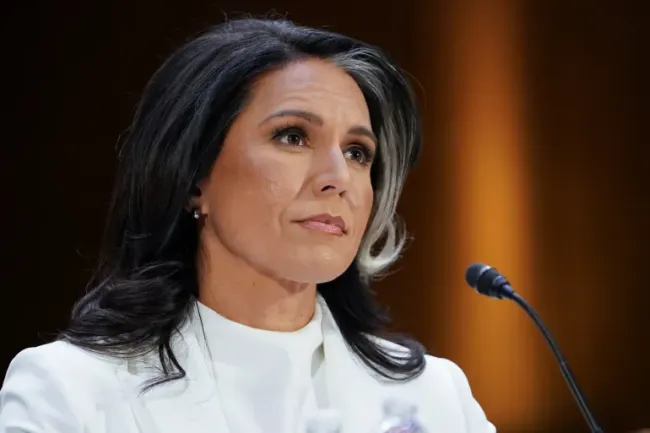Tulsi Gabbard Confirmed as Director of National Intelligence: A Polarizing Victory for Trump’s Agenda
The U.S. Senate voted 52-48 on February 12, 2025, to confirm Tulsi Gabbard as the next director of national intelligence (DNI), marking a contentious yet decisive milestone in President Donald Trump’s efforts to reshape the federal government. The confirmation, largely along party lines, underscores the deepening partisan divide over national security and the role of intelligence agencies. Here’s a breakdown of the key developments and what they mean.
The Confirmation Vote: A Narrow Margin
Gabbard’s confirmation hinged on near-unanimous Republican support, with only one Republican senator breaking ranks to join all Democrats in opposition. Her nomination faced skepticism from both parties due to her unconventional background: a former Democratic congresswoman from Hawaii, Army Reserve lieutenant colonel, and 2020 presidential candidate who left the Democratic Party in 2022 and endorsed Trump in 2024.
Key swing votes ultimately backed Gabbard after closed-door meetings where she reportedly addressed concerns about her past positions. Some senators praised her commitment to “right-sizing” the Office of the DNI, which critics argue has grown overly bureaucratic.
Controversies That Defined the Battle
Gabbard’s nomination was fraught with controversy, centering on:
- Sympathy for Authoritarian Regimes:
Her 2017 meeting with Syrian dictator Bashar al-Assad—and subsequent skepticism about his use of chemical weapons—drew bipartisan criticism. Gabbard defended the visit, claiming she pressed Assad on human rights abuses, but opponents accused her of legitimizing a war criminal. - Edward Snowden and Surveillance:
Gabbard’s past support for pardoning Snowden, the NSA whistleblower, haunted her hearings. While she conceded Snowden “broke the law,” she refused to label him a “traitor,” frustrating some Republicans. - FISA Section 702 Reversal:
Initially a critic of the surveillance tool, Gabbard reversed her stance during confirmation, calling it “essential” after reforms—a shift critics labeled opportunistic. - Echoes of Russian Propaganda:
Democrats highlighted her past remarks echoing Kremlin talking points, including blaming NATO for Russia’s 2022 invasion of Ukraine.
Reactions: A Clash of Visions
- Republican Support:
Many Republicans lauded Gabbard’s “independent thinking” and military service, framing her as a reformer to depoliticize intelligence. Some emphasized her pledge to “eliminate redundancies” in the intelligence community. - Democratic Opposition:
Democrats lambasted Republicans for backing a nominee with “no intelligence experience” and a history of “echoing Russian propaganda.” Some called her Trump’s “worst nominee to date.” - Lone Dissent:
One prominent Republican senator issued a scathing statement, warning that Gabbard’s “alarming lapses in judgment” risked tainting intelligence assessments.
Implications for U.S. Intelligence
Gabbard’s confirmation signals a dramatic shift in the intelligence community’s trajectory:
- Trump’s Mandate: She vowed to align intelligence priorities with Trump’s vision, including curbing “politicization” and refocusing on threats like “radical Islamic terrorism.”
- Structural Overhaul: Promises to streamline the DNI’s role and reduce bureaucracy could reshape how intelligence is collected and shared.
- Global Relationships: Allies may question U.S. reliability given Gabbard’s past skepticism of NATO and openness to Russian narratives.
A Symbol of Partisan Loyalty
Gabbard’s ascent reflects Trump’s enduring influence over the GOP. Despite reservations, Republicans largely fell in line, pressured by Trump’s base and influential allies. Her confirmation also highlights the evolving identity of a party increasingly aligned with anti-establishment figures.
Conclusion
Tulsi Gabbard’s confirmation as DNI is more than a personnel change—it’s an ideological battleground. Supporters see her as a disruptor poised to root out corruption; critics fear she’ll undermine intelligence integrity. As she takes the helm of 18 agencies, her ability to navigate these tensions will shape U.S. security for years to come.
